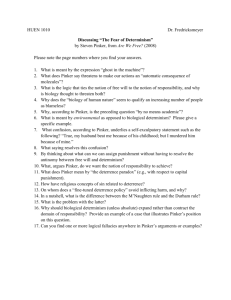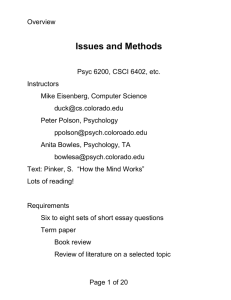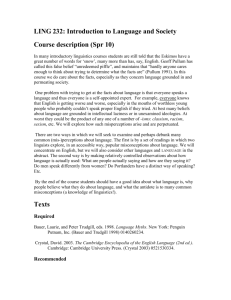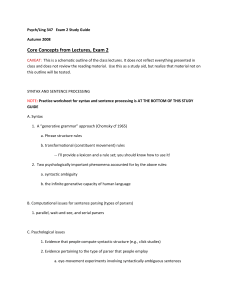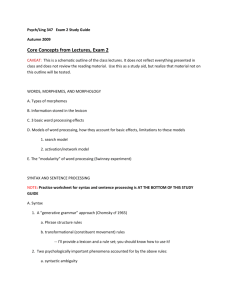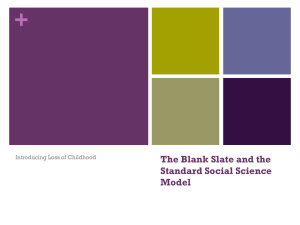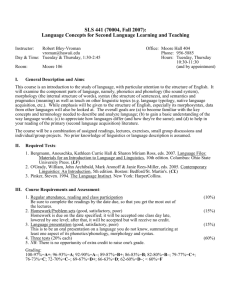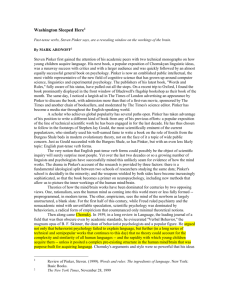Syllabus: Psychology of Language
advertisement
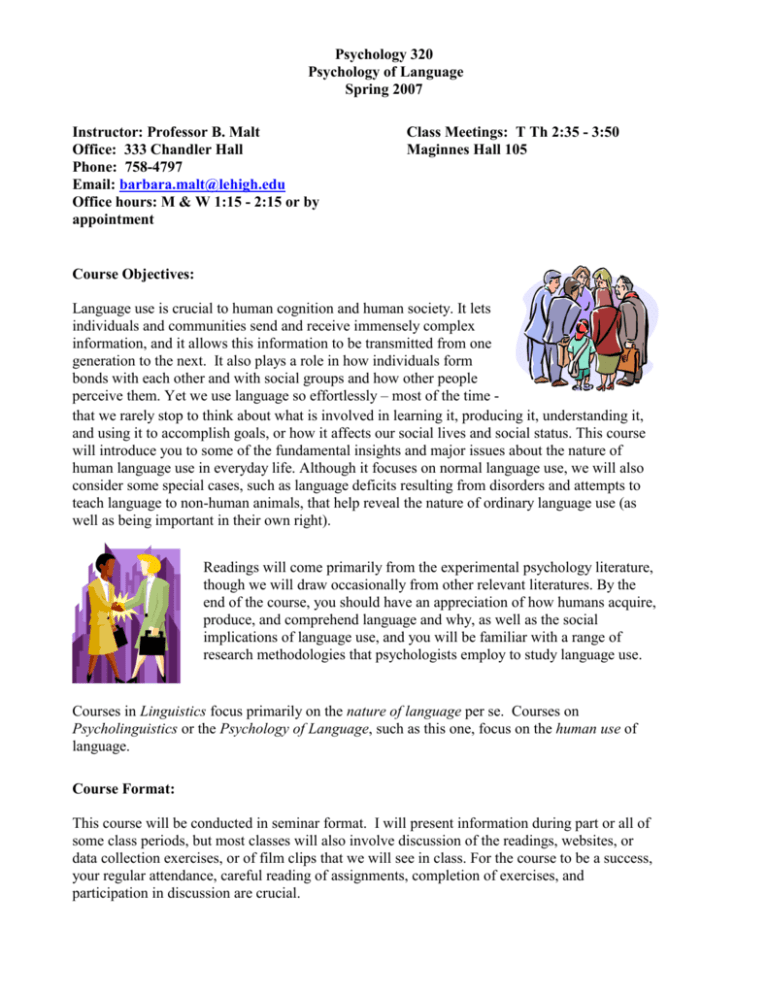
Psychology 320 Psychology of Language Spring 2007 Instructor: Professor B. Malt Office: 333 Chandler Hall Phone: 758-4797 Email: barbara.malt@lehigh.edu Office hours: M & W 1:15 - 2:15 or by appointment Class Meetings: T Th 2:35 - 3:50 Maginnes Hall 105 Course Objectives: Language use is crucial to human cognition and human society. It lets individuals and communities send and receive immensely complex information, and it allows this information to be transmitted from one generation to the next. It also plays a role in how individuals form bonds with each other and with social groups and how other people perceive them. Yet we use language so effortlessly – most of the time that we rarely stop to think about what is involved in learning it, producing it, understanding it, and using it to accomplish goals, or how it affects our social lives and social status. This course will introduce you to some of the fundamental insights and major issues about the nature of human language use in everyday life. Although it focuses on normal language use, we will also consider some special cases, such as language deficits resulting from disorders and attempts to teach language to non-human animals, that help reveal the nature of ordinary language use (as well as being important in their own right). Readings will come primarily from the experimental psychology literature, though we will draw occasionally from other relevant literatures. By the end of the course, you should have an appreciation of how humans acquire, produce, and comprehend language and why, as well as the social implications of language use, and you will be familiar with a range of research methodologies that psychologists employ to study language use. Courses in Linguistics focus primarily on the nature of language per se. Courses on Psycholinguistics or the Psychology of Language, such as this one, focus on the human use of language. Course Format: This course will be conducted in seminar format. I will present information during part or all of some class periods, but most classes will also involve discussion of the readings, websites, or data collection exercises, or of film clips that we will see in class. For the course to be a success, your regular attendance, careful reading of assignments, completion of exercises, and participation in discussion are crucial. DATE Jan 16 18 23 25 TOPIC T Th T Th Introduction Language & Communication ASSIGNMENT Lederer (Sound and sense) Fouts, ch. 2 (Baby in the family) Pinker, ch. 11 Savage-Rumbaugh & Lewin, ch. 5 (First glimpse) Jan 30 T Feb 1 Th Language & Thought Pinker, ch. 3 Pullum (Eskimo) Au Miller, Smith, Zhu, & Zhang Feb 6 T 8 Th 13 T Meaning Pinker, ch. 5 Malt Lederer (Janus-faced English) Lederer (You said a mouthful) http://www.lehigh.edu/~inmotion/treadmill/treadmill.1_punjabi. htm (a look at a current experiment of mine on word meaning across languages -- click on some of the clips or do the whole thing) Malt & Eiter 1st data collection exercise due Pinker, ch. 4; ch. 7 through p 221 Bock (Producing agreement) http://www.dubyasays.com/ (the competence-performance distinction - or not) http://www.alphadictionary.com/articles/drgw001.html (Will I Be Arrested if I End a Sentence with a Preposition?) Pinker, ch. 7, pp. 222-230 Francik and Clark Feb 13 Feb 15 Th 20 T 22 Th Feb 27 T Feb 27 Mar 1 Mar (6 (8 Mar 13 15 T Th T) Th) T Th Sentence Processing: Parsing and Memory Sentence Processing: Pragmatics (begin) term paper topic question due 1st exam Spring Break! Sentence Processing: Pragmatics (finish) 2nd data collection exercise due Mar 15 Th Mar 20 T 22 Th Mar 22 Th Tannen (How to close the comm. gap..) Tannen (How to give orders…) Speech Pinker, ch. 6 Eimas Bock (language production; MIT) http://www.fun-with-words.com/spoon_history.html (On Rev. Spooner) 3rd data collection exercise due Mar 27 T 29 Th Apr 3 T Apr 3 T Apr 5 Th 10 T Acquisition Biological Foundations Apr 12 Th 17 T Sign Language Apr 19 T 24 Th 26 T Language & Society May 1 Pinker, ch. 9 Lederer (Tense times with verbs) Brownlee Markman Term paper reference list due Pinker, ch. 10, ch. 2 Goldin-Meadow & Mylander Newport http://faculty.washington.edu/chudler/image.html (brain imaging techniques) http://www.une.edu.au/langnet/tokpisin.htm#sounds-hce (on Tok Pisin, a pidgin becoming a Creole) (no Pinker chapter) Bellugi Wolkomir http://commtechlab.msu.edu/sites/aslweb/browser.htm (American Sign Language Browser. Note: needs Quicktime movie viewer.) http://www.britishsignlanguage.com/ (British Sign Language Dictionary. Compare some words in ASL & BLS Pinker, ch. 12 Pullum (linguistic fascists) Pullum (language that…) Nunberg (Ain’t misbehavin’) http://cfprod01.imt.uwm.edu/Dept/FLL/linguistics/dialect/maps. html (take a look at the maps for different words) term paper due, 5:00 Readings (required): Text. Pinker, S. (1995). The Language Instinct: How the Mind Creates Language. New York: William Morrow. We will read much, but not all, of this book. Supplementary readings. These readings will be available on Blackboard, the electronic course resource. Look for them under “Course Documents”. You can read them on-line or download and print them for yourself. Websites. For some topics, a website is also listed. Please take a few minutes to go to these websites, read the page, and poke around. They contain interesting text, demonstrations, or illustrations (in color!) of things not presented in visual form in the readings. You may also find links that will lead to other sites that will interest you. Blackboard Course Site: Announcements and other information for this course may occasionally be posted on Blackboard, in addition to the supplementary readings. The syllabus will be posted there so that you can click on the assigned links. To reach our course on Blackboard, go to https://ci.lehigh.edu/webapps/login. Requirements: Exams. There will be two short-answer/short-essay exams, each covering approximately half of the course material. The first will be during the regular semester, as indicated on the syllabus. Note that it is the Thursday before Spring Break. Please do not plan to leave town before the exam. The second will be during finals week. Please do not schedule your departure from Lehigh before the exam schedule is announced. Paper. A term paper (about 10 pp.) is required. Your paper must address a central question about some aspect of language use (e.g., “Is there a critical period for language learning?” or “Can nonhuman primates acquire language?” or “Is American Sign Language a full-fledged language?”). The paper should review and evaluate about 5 articles relevant to the question, and it should present a wellreasoned argument for an answer to the question. I will distribute a list of possible questions to address. You may also formulate your own question, but please make an appointment to see me to discuss your choice. Your choice of topic will be due on February 27. A list of source references for the paper is due on April 3, along with a photocopy of the first page of each source. The paper will be due right after RCS, on May 1, by 5:00. Data collection exercises. There will be several data collection exercises during the semester, in which you will collect data on a particular aspect of language outside of class and bring the data to class. A brief written report of the data (2-3 pp.), addressing specified questions, will be required for two of them. The written reports will be due on approximately Feb. 13 and March 15. (No written reports are due during the latter part of the semester to allow you more time to work on your paper.) Class participation. Student participation is critical for a good seminar. All students are expected to read the assignments in advance of class, to participate in discussion, and to have data collection exercises completed and available in class for discussion as assigned. In addition, students will be asked to take turns preparing discussion questions for the readings. To encourage and reward good preparation and participation, a significant portion of your grade is reserved for class participation. (Preparation of discussion questions on your turns is counted in this portion of the grade.) Accommodation for Disabilities: If you think you may need any special accommodations for a disability, please contact Academic Support Services in the Dean of Students office for evaluation. They will provide a letter specifying what accommodations, if any, are appropriate. Accommodations cannot be made without this letter. Grading: The two exams will be worth 20% each. The term paper will be worth 22% (2% for the reference list and 20% for the paper itself). The written data collection reports will be worth 8% each. Class participation will be worth 22%. Exam and Paper Policy: Unexcused late papers will be penalized half a grade per day late, as will unexcused late data collection exercises. (If you have a compelling reason why you need an extension, I may be willing to grant one, but only if you talk to me before the due date.) Missed exams may be made up only in case of serious illness or other emergency, and a signed note from a doctor must accompany requests. Bibliography Au, T. (1992). Counter-factual reasoning. In G. R. Semin & K. Fiedler (Eds.), Language, interaction, and social cognition (pp. 194-213). London: Sage. Bellugi, U. (1988). The acquisition of a spatial language. In F. Kessel (Ed.). The development of language and language researchers: Essays in honor of Roger Brown (pp. 153-183). Hillsdale, NJ: Lawrence Erlbaum. Bock, K. (1995). Producing agreement. Current Directions in Psychological Science, 4, 56-60. Bock, K. (1999). Language production. MIT Encyclopedia of the Cognitive Sciences (pp. 453-456). Cambridge, MA: The MIT Press. Brownlee, S. (1998). Baby talk. U.S. News & World Report, June 15, 48-55. Eimas, P. D. (1991). The perception of speech in early infancy. In W. S.-Y. Wang (Ed.), The Emergence of language: Development and evolution (Readings from Scientific American). New York: W. H. Freeman and Co. Fouts, R. (1997). Next of kin. New York: Harper Collins. Francik, E., & Clark, H. H. (1985). How to make requests that overcome obstacles to compliance. Journal of Memory and Language, 24, 560 - 568. Goldin-Meadow, S. & Mylander, C. (1998). Spontaneous sign systems created by deaf children in two cultures. Nature, 391, 279-281. Hampton, J. (1999). Concepts. MIT Encyclopedia of the Cognitive Sciences (pp. 176-178). Cambridge, MA: The MIT Press. Horn, L. (1999). Implicature. MIT Encyclopedia of the Cognitive Sciences (pp. 391-393). Cambridge, MA: The MIT Press. Lederer, R. (1990). Crazy English. New York: Pocket Books. Malt, B. C. (1998). Word meaning. In W. Bechtel and G. Graham (Eds.). A companion to cognitive science (pp. 331-337). Oxford: Basil Blackwell. Markman, E. M. (1990). Constraints children place on word meanings. Cognitive Science, 14, 57-78. Miller, K. F., Smith, C. M., Zhu, J., & Zhang, H. (1995). Pre-school origins of cross-national differences in mathematical competence: The role of number-naming systems. Psychological Science, 1, 56 - 60. Newport, E. L. (1990). Maturational constraints on language learning. Cognitive Science, 14, 11-28. Nunberg, G. Ain’t misbehavin’. Fresh Air commentary, Sept. 11, 2002. Available at http://wwwcsli.stanford.edu/~nunberg/aint.html Pinker, S. (1995). The Language Instinct: How the Mind Creates Language. New York: William Morrow. Pullum, G. K. (1994). Here come the linguistic fascists. In G. K. Pullum, The great Eskimo vocabulary hoax and other irreverent essays on the study of language (pp. 111-119). Chicago: University of Chicago Press. Pullum, G. K. (1994). The great Eskimo vocabulary hoax. In G. K. Pullum, The great Eskimo vocabulary hoax and other irreverent essays on the study of language (pp. 159-171). Chicago: University of Chicago Press. Pullum, G. K. (1997). Language that dare not speak its name. Nature, 386, 321-322. Savage-Rumbaugh, S. & Lewin, R. (1994). Kanzi: The ape at the brink of the human mind. New York: John Wiley and Sons. Tannen, D. (1991). How to close the communication gap between men and women. McCall’s, May, pp. 99-102; 139-140. Tannen, D. (1994). How to give orders like a man. The New York Times Magazine, August 28, pp. 46 - 49. Wolkomir, R. (1992). “It’s not mouth stuff – It’s brain stuff”. Smithsonian, July (vol 23, no. 4), pp. 30-41. Additional Language-Related Websites, for Fun and/or Extra Information The Language Log (a blog by U Penn linguists and others on silly things written about language in the general media, and other commentary) http://itre.cis.upenn.edu/~myl/languagelog/ Antagonyms (words that mean one thing and the opposite) http://www-personal.umich.edu/~cellis/antagonym.html The Klingon Language Institute http://www.kli.org/ The problem of English spelling-sound correspondence (or lack of), in verse http://www.yourdictionary.com/library/tough.html Internet lingo: http://www.yourdictionary.com/library/article010.html “Ain’t” Isn’t a Four-letter Word http://www.alphadictionary.com/articles/drgw003.html Yall (Youse, Yuns) Should Read This http://www.alphadictionary.com/articles/drgw006.html Shabby Seedlings and Tennis Rankings (on the meanings of the word “seed”) http://www.yourdictionary.com/library/seeds.html The Awful German Language (a famous essay by Mark Twain) http://eserver.org/langs/the-awful-german-language.txt Homosexuals and Homo Sapiens: A Formal Confusion http://www.yourdictionary.com/library/homo.html Gallaudet Research Institute (for the study of deafness) http://gri.gallaudet.edu/ The Deaf Resource Library (intended to educate and inform people about Deaf cultures in Japan and the United States) http://www.deaflibrary.org/ About Japanese Sign Language http://www.deaflibrary.org/jsl.html British Sign Language community http://www.signcommunity.org.uk/index.php Laurent Clerc National Deaf Education Center http://clerccenter.gallaudet.edu/InfoToGo/index.html NPR interview on Kanzi http://www.primatesworld.com/ChimpTalk.html PBS Scientific American Frontiers On-Line (contains video segments on animal intelligence and language-learning abilities) http://www.pbs.org/saf/1201/video/watchonline.htm?user8=pbssaf&template8=publishmain.html&query8=scientific+american&squery8=squery%3D%252BClipID% 3A4%2B%252BVideoAsset%3Apbssaf1201&select7=2670149&submit8=GO Rickford’s Suite for Ebony and Phonics http://www.stanford.edu/~rickford/papers/SuiteForEbonyAndPhonics.html Additional writings by sociolinguist John Rickford on Ebonics http://www.stanford.edu/~rickford/ebonics/ Philosophy Comix (contains a set of Logic and Language cartoons) http://members.aol.com/lshauser/phlcomix.html#logic Basics of Brain Imaging http://www.nida.nih.gov/NIDA_Notes/NNVol11N5/Basics.html Brain Imaging Demos http://www.bic.mni.mcgill.ca/demos/ National Aphasia Association http://www.aphasia.org/ popular press article on infant speech perception http://www.jhu.edu/~jhumag/0298web/baby.html
